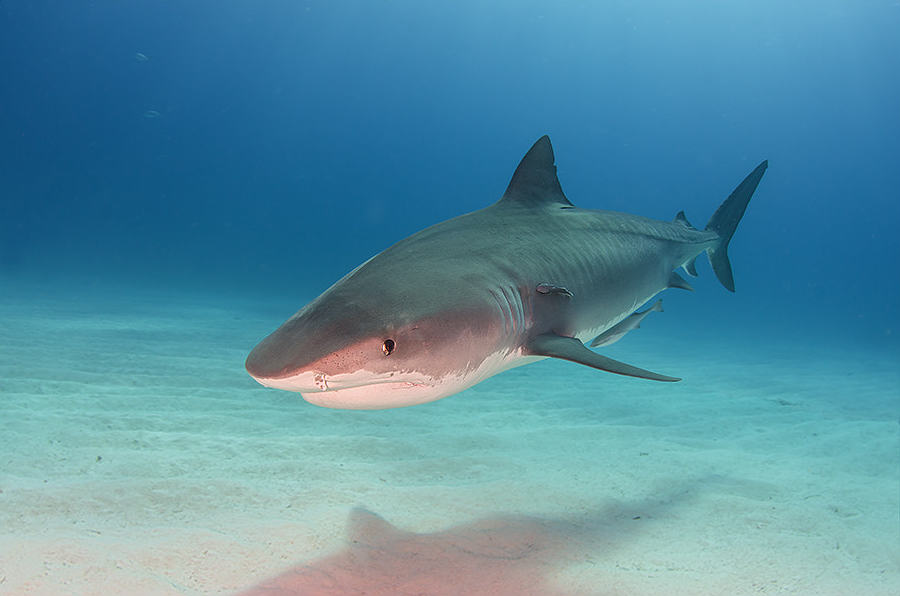
The long-running Discovery Channel series “Shark Week” is likely contributing to a collective public perception of sharks as bad — but even relatively small changes could substantially improve the show’s presentation of sharks, shark science and conservation issues, and scientists, according to a newly published study.
The article, “A content analysis of 32 years of Shark Week documentaries,” was released today in PLOS ONE, a peer-reviewed open access scientific journal published by the Public Library of Science.
“‘Shark Week’ is a high-profile, international programming event that has potentially enormous influence on public perceptions of sharks, shark research, shark researchers and shark conservation,” said lead author Lisa Whitenack, Ph.D., associate professor of biology and geology at Allegheny College. “However, Shark Week has received regular criticism in the media for poor factual accuracy, fearmongering, bias and inaccurate representations of science and scientists.”
The study analyzes the content and titles of “Shark Week” episodes across 32 years of programming to determine if there are trends in the species covered, research techniques featured, expert identity, conservation messaging, type of programming and portrayal of sharks. Researchers watched and analyzed more than 200 episodes of the show, developing an extensive coding process to record their observations.
Key findings of the study include:
- Nearly three-quarters (73.6%) of the analyzed episodes included some sort of fear-mongering language or negative portrayal of sharks as perceived by the researchers — mostly focused on shark bites on humans. While 63.2% of the episodes had at least one mention of sharks as awe-inspiring, beautiful, misunderstood or ecologically important, this was often a brief mention that played over the ending credits. Additionally, many “Shark Week” episode titles may contribute to fear, such as “Sharkpocalypse,” “Deadly Stripes,” “Great White Serial Killer,” and “Sharks: Are They Hunting Us?”.
- Depictions of research and of experts in “Shark Week” disproportionately focus on a small set of (typically visual and expensive) research methodologies and (mostly white, mostly male) experts, including the presentation of many white male non-scientists as scientific experts. This does not reflect the diversity of either the scientists in this field or the research these scientists undertake.
- Researchers identified just six specific and detailed mentions of how the show’s massive audience could support shark conversation efforts. Additionally, the three most commonly featured species in the show are not any of the species of greatest conservation concern, and the most critically endangered species have never been featured at all.
Nevertheless, the study notes that even minor adjustments to “Shark Week” could have a meaningful effect on public perception of sharks. Recommended improvements include reducing harmful sensationalism, enhancing factual accuracy and raising editorial standards, and distinguishing more definitively between fact-based and fictional programming. The study also suggests that the series more clearly differentiate between scientific and non-scientific experts to avoid inadvertently legitimizing incorrect information.
“While not all science may be especially camera-friendly, there is plenty of real scientific research that is important and interesting to watch,” Whitenack said.
In addition, researchers note that “Shark Week” would benefit from emphasizing more realistic scientific methods and a wider range of shark species. “Shark Week” should also work to feature a more diverse range of scientists, according to the study. Of the hosts and experts featured in more than five episodes, there were more men who were non-scientists named “Mike” than there were women of any name or occupation.
“Together, these changes would likely help with the series’ factual accuracy while also benefiting the diversification of shark science, recruitment in STEM and public recognition of the work of scientists from historically and contemporarily marginalized groups,” Whitenack said.
Along with Whitenack, the study’s authors include Brady L. Mickley (Allegheny College Class of 2022, environmental science and sustainability major and biology minor), Julia Saltzman (University of New Hampshire Department of Biological Sciences), Stephen M. Kajiura, Ph.D. (Florida Atlantic University Department of Biological Sciences), Catherine C. Macdonald, Ph.D. (University of Miami Rosenstiel School of Marine and Atmospheric Science) and David S. Shiffman, Ph.D. (Arizona State University New College of Interdisciplinary Arts and Sciences).


